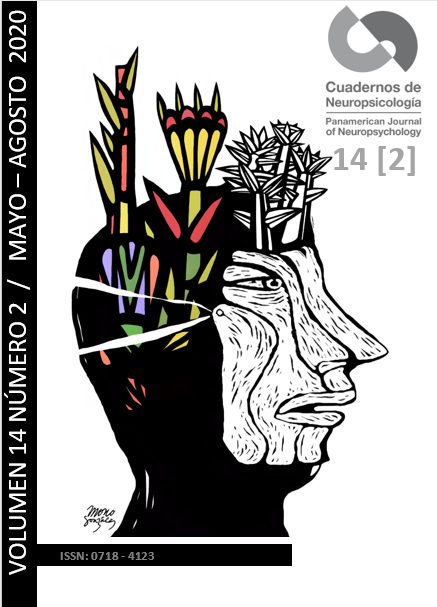El brote pandémico de covid-19 y las implicaciones para la adicción a internet
Abstract
RESUMEN
El brote pandémico de COVID-19 es un problema de salud pública y plantea un desafÃo a la resiliencia biológica, psicológica y social. Entre los individuos vulnerables están quienes tienen desordenes por el uso de sustancias. La adicción puede ocurrir de muchas maneras como las adicciones conductuales. En este estudio evaluamos la adicción a Internet antes y durante el confinamiento fÃsico en estudiantes universitarios. Se evaluaron a 300 estudiantes, 150 participantes antes del confinamiento fÃsico, y 150 durante el confinamiento fÃsico. Todos respondieron un cuestionario de 26 reactivos que midió la adicción a Internet. Los resultados mostraron que previo al confinamiento fÃsico el 38,67% presentaban adicción a Internet mientras que el 61,33% presentaban conducta de riesgo. Los datos durante el confinamiento variaron, el 8,16% mostraron adicción a Internet, el 51,02% no mostró adicción, y el 40,08% fueron sujetos de riesgo. Discutimos las implicaciones para estudiar, prevenir y tratar las adicciones conductuales.
Palabras Clave: Adicción conductual; SARS-CoV2; estudiantes universitarios; confinamiento fÃsico; artÃculo original.
Â
ABSTRACT
The pandemic outbreak of COVID-19 poses a challenge to biological, psychological and social resilience. Vulnerable individuals include those who have substance use disorders. Addiction can occur in many forms like behavioral addictions. This study Internet addiction previous and during physical confinement was evaluated. We evaluated 300 undergraduate students, 150 before the confinement and 150 during the confinement period. All completed a 26â€item measure of Internet addiction questionnaire. Results showed in the previous condition that 38,67% were in Internet addiction condition, while 61,33% were in risk condition. In physical confinement, 8,16% were in Internet addiction condition, 51,02% did not show Internet addiction, while the 40,08% were in risk condition. Implications for the study, prevention, and treatment of behavioral addictions are discussed.
Key words: Behavioral addiction; SARS-CoV2; college students; physical confinement; original article.
Â
RESUMO
O surto pandêmico de Covid-19 é um problema de saúde pública e aponta para um desafio à resiliência biológica, psicológica e social. Entre os indivÃduos vulneráveis estão aqueles que tem desordens pelo uso de substâncias. O vÃcio pode ocorrer de muitas maneiras, como os vÃcios comportamentais. Neste estudo, avaliamos o vÃcio em Internet antes e durante o confinamento fÃsico em estudantes universitários. Foram avaliados 300 estudantes, 150 participantes antes do confinamento fÃsico, e 150 durante o confinamento fÃsico. Todos responderam um questionário de 26 reagentes que mediram o vÃcio em Internet. Os resultados mostraram que anterior ao confinamento fÃsico, 38,67% apresentavam vÃcio em Internet enquanto 61,33% apresentavam comportamento de risco. Os dados durante o confinamento variaram, sendo que 8,16% mostraram vÃcio em Internet, 51,02% não apresentou vÃcio, e 40,08% foram sujeitos de risco. Discutimos as implicações para estudar, prevenir e tratar os vÃcios comportamentais.
Palavras-chave: VÃcios comportamentais; SARS-CoV2; estudantes universitários; confinamento fÃsico; artigo original.
Downloads
How to Cite
Issue
Section
License
Articles published in this journal are protected under the Creative Commons Attribution-NonCommercial-ShareAlike 4.0 International (CC BY-NC-SA 4.0) license. This means that authors retain full rights over their research and publications at all times. As a journal, we fully respect and promote the principles of open access established by this license, allowing the work to be shared, adapted, and distributed for non-commercial purposes, provided that appropriate credit is given to the authors and any derivative works are licensed under the same terms.
Authors are responsible for obtaining the required permission when they wish to reproduce part of the material (figures, etc.) from other publications.
Likewise, CNPs allows authors to host in their personal sites or other repositories that they deem convenient the Final and Definitive Version of the published article with the format assigned by the journal. In no case do we allow access to preprints of the article under evaluation or already published.
When submitting an article to CNPs you are aware that all the contents of CNPs are under a Creative Commons License. In which it is allowed to copy and share the contents freely, always making reference to the origin of the publication and its author.












